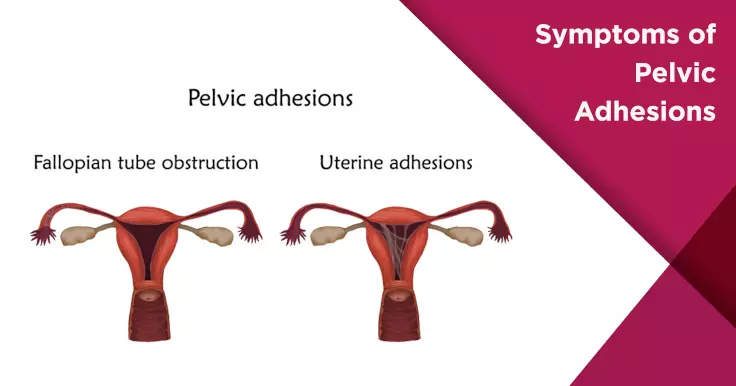Pelvic Adhesions and Infertility
Pelvic adhesions are a common result of pelvic inflammatory disease. Signs of pelvic inflammatory diseases that could result in pelvic adhesions include pain in the lower abdomen, foul-smelling discharge from the vagina, fever, nausea, painful urination and pain during sexual intercourse. This disease could cause scar tissue to build up in the fallopian tubes, ovaries and uterus that eventually turn in to pelvic adhesions. If these adhesions block the fallopian tubes, it could result in infertility. Women with pelvic adhesions are also at a high risk of experiencing an ectopic pregnancy and repeated miscarriages.
Pelvic Adhesions Symptoms and Complications
In many cases, pelvic adhesions are painless and asymptomatic. Many women are diagnosed with this condition only after they seek treatment for other issues such as infertility. In other cases, it may cause complications such as:
Bowel Obstructions
Pelvic adhesions are responsible for 60-70% of cases of bowel obstructions in adults. This causes chronic pelvic pain.
Adhesion Related Disorder (ARD)
ARD refers to a group of symptoms caused by pelvic adhesions. Some of these symptoms may be generalized and vague while others may be specific to one part of the abdomen. Thus, ARD can be difficult to diagnose. In many cases, it may be mistaken as signs of endometriosis, chronic fatigue syndrome, irritable bowel syndrome, depression, anxiety and fibromyalgia.
Some of the symptoms include:
- Chronic abdominal pain
- Inability to pass gas
- Bowel obstruction
- Difficulty passing bowel movements
- Painful bowel movements
- Urinary bladder dysfunction
- Infertility
- Pain while sitting or lying in certain positions
- Pain while walking
- Depression
- Thoughts of helplessness and suicide
- Constipation or constipation that alternates with diarrhoea
- Anxiety
Can Abdominal Adhesions be prevented?
Abdominal adhesions are difficult to prevent. However, opting for minimally invasive surgical procedures instead of open surgery wherever possible can reduce the risk of these adhesions. In the case of open surgeries, inserting a special film-like material between organs can help hydrate the organs and keep adhesions from forming.
 Infertility Counselling
Infertility Counselling Female Infertility Treatment
Female Infertility Treatment Andrology Treatment
Andrology Treatment Fertility Enhancing Surgeries - Female
Fertility Enhancing Surgeries - Female Fertility Enhancing Surgeries - Male
Fertility Enhancing Surgeries - Male Endoscopy Treatment
Endoscopy Treatment IUI Treatment
IUI Treatment IVF Treatment
IVF Treatment ICSI Treatment
ICSI Treatment Advanced IVF Solutions
Advanced IVF Solutions Embryology
Embryology Vitrification Egg, Embryo, Sperm Freezing
Vitrification Egg, Embryo, Sperm Freezing Preimplantation Genetic Testing (PGT)
Preimplantation Genetic Testing (PGT) Donation Program Embryo / Egg / Sperm
Donation Program Embryo / Egg / Sperm Self-cycleTM IVF
Self-cycleTM IVF

 Self-cycleTM IVF
Self-cycleTM IVF












